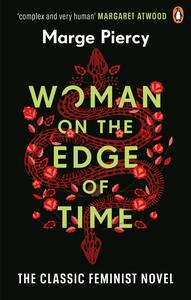You need to sign in or sign up before continuing.
Take a photo of a barcode or cover
This book jumps between the experiences of 1970s Consuelo (Connie) Ramos in New York and the future of 2137. Connie is poor, lacks a college degree, and is Mexican-American. She has also been labeled "violent" and "mentally ill" for two reasons. One, her lover, Claud, died and she hit her daughter in a drunken haze of anger and despair. Two, she attacked her niece's pimp and broke his nose. Much of the 1970s narrative is set in a dismal inpatient mental institution to which Connie was involuntarily committed after she attacked her niece's pimp.
While in-between her first and second involuntary commitment, Connie encounters Luciente, a person from the future. Luciente seems corporeal, but is actually a mental projection. Connie is able to visit the future in the same way, as a mental projection. She finds the gender-neutral, technologically restrained, ecologically conscious future to be quite confusing. Especially when she snaps back to her bleak, over-medicated present. The crux of the novel is what will Connie choose to do about this potential future?
Marge Piercy wrote a new introduction for the 2016 edition of the book that explained how she was able to portray such an accurate picture of mental health care (or the lack of it) in the 1970s. At that time, anyone labeled "mentally ill" had no rights, legal or civil. Informed consent for treatment did not exist, and one of the most horrendous human experiments in New York history (Willowbrook) is mentioned in the book. As I nurse, I have practiced since the 1970s, and Piercy's depiction of mental health institutions is disturbingly accurate for that time period.
The triple jeopardy of being female, poor, and a woman of color is also a strong theme in the book. Women's rights were not written into law in the 1970s, and Connie suffers because of this lack of rights. This is why the future confuses her and why she has to make a painful choice.
While in-between her first and second involuntary commitment, Connie encounters Luciente, a person from the future. Luciente seems corporeal, but is actually a mental projection. Connie is able to visit the future in the same way, as a mental projection. She finds the gender-neutral, technologically restrained, ecologically conscious future to be quite confusing. Especially when she snaps back to her bleak, over-medicated present. The crux of the novel is what will Connie choose to do about this potential future?
Marge Piercy wrote a new introduction for the 2016 edition of the book that explained how she was able to portray such an accurate picture of mental health care (or the lack of it) in the 1970s. At that time, anyone labeled "mentally ill" had no rights, legal or civil. Informed consent for treatment did not exist, and one of the most horrendous human experiments in New York history (Willowbrook) is mentioned in the book. As I nurse, I have practiced since the 1970s, and Piercy's depiction of mental health institutions is disturbingly accurate for that time period.
The triple jeopardy of being female, poor, and a woman of color is also a strong theme in the book. Women's rights were not written into law in the 1970s, and Connie suffers because of this lack of rights. This is why the future confuses her and why she has to make a painful choice.
One of my all-time favourite dark rides... with an intense smattering of light.
A feminist dystopia/utopia novel. A woman in current age can time travel to the future. She mainly visits a feminist utopian version, where people are free to live as they wish, both men and women can have babies and everything is shared. Every now and then she visits the dystopian future, which seems like a version that’s closer to our current way of living. Most of the book is describing the workings of this feminist utopia and the interactions between people. This time travelling leads the protagonist to take action in her current world. And so you are left wondering whether it was all in her head.
dark
emotional
reflective
sad
medium-paced
Plot or Character Driven:
Character
Strong character development:
Yes
Loveable characters:
Complicated
Diverse cast of characters:
Yes
Flaws of characters a main focus:
Complicated
dark
hopeful
sad
slow-paced
Plot or Character Driven:
Character
Strong character development:
Complicated
Loveable characters:
Complicated
Diverse cast of characters:
Yes
Flaws of characters a main focus:
No
challenging
dark
reflective
slow-paced
Plot or Character Driven:
A mix
Strong character development:
Complicated
Loveable characters:
Yes
Diverse cast of characters:
Yes
Flaws of characters a main focus:
Complicated
Coming back to change my rating because I think about this book constantly.
One Flew Over the Cuckoo's Nest, meets The Handmaid's Tale, with a bit of Brave New World, and some time travel.
A brilliant critical analysis of 1970s society (which is still sadly very relevant). With a hopeful vision of the future where true equality has finally been achieved.
A brilliant critical analysis of 1970s society (which is still sadly very relevant). With a hopeful vision of the future where true equality has finally been achieved.
Aren't men utter utter utter bastards?!?!
Long ago when I were a lad I heard Dave Lee Travis (amazingly unscathed by Yewtree!) the hairy cornflake interviewed Patrick McGoohan (Danger Man the Prisoner). DLT: "Does the Prisoner ever escape?"
McGoohan: "The Prisoner can never escape; the Prisoner is you. The Prisoner is me"
Interesting to read sci-if from that's 40 years old that feels so fresh...definitely deserving of the "literary" descriptor 'speculative fiction'.
The present in the mental hospital felt horribly real and true, as did Connie's disenfranchisement. After reading so many (American) books where the protagonist is always a writer, or just really well-off, it was refreshing to read from the point of view of a ‘nobody’. The dreadful macho men in her life, the pimps and lowlifes.
I liked that she was so critical of the Future, finding fault in their lives, incredulous at the villageness of it. The book asked more questions than it answered (as it must): when she visited the Future was it the same place or different time-streams? Piercy could have given us the alternative ‘Nasty’ Future of the Enemy (presumably) with sex-slaves and cosmetic surgery the norm (remind you of anywhere?)
As a meditation on gender the book was worryingly up to date, the only men she knew were macho, angry men who easily used violence, against each other, against "their women"
Maybe the end shouldn't have been quite so ambiguous....but there wasn't a better way to end.
The "time travel" was one of the most original I've read (the pickle jar in Spoiled Brats by Simon Rich has to be the most original!)
Long ago when I were a lad I heard Dave Lee Travis (amazingly unscathed by Yewtree!) the hairy cornflake interviewed Patrick McGoohan (Danger Man the Prisoner). DLT: "Does the Prisoner ever escape?"
McGoohan: "The Prisoner can never escape; the Prisoner is you. The Prisoner is me"
Interesting to read sci-if from that's 40 years old that feels so fresh...definitely deserving of the "literary" descriptor 'speculative fiction'.
The present in the mental hospital felt horribly real and true, as did Connie's disenfranchisement. After reading so many (American) books where the protagonist is always a writer, or just really well-off, it was refreshing to read from the point of view of a ‘nobody’. The dreadful macho men in her life, the pimps and lowlifes.
I liked that she was so critical of the Future, finding fault in their lives, incredulous at the villageness of it. The book asked more questions than it answered (as it must): when she visited the Future was it the same place or different time-streams? Piercy could have given us the alternative ‘Nasty’ Future of the Enemy (presumably) with sex-slaves and cosmetic surgery the norm (remind you of anywhere?)
As a meditation on gender the book was worryingly up to date, the only men she knew were macho, angry men who easily used violence, against each other, against "their women"
Maybe the end shouldn't have been quite so ambiguous....but there wasn't a better way to end.
The "time travel" was one of the most original I've read (the pickle jar in Spoiled Brats by Simon Rich has to be the most original!)
One of my favourite books, Fantasy, psychiatry, socialism...
Probably excellent for its time. The core of the ideas still hold up. The violence of the first chapters seems unnecessarily out of proportion to the rest of the book, but perhaps it seems that way to a reader who is more aware of (this kind of) oppression than to a reader who is naive to it. I enjoyed the ideas more than the writing itself.





